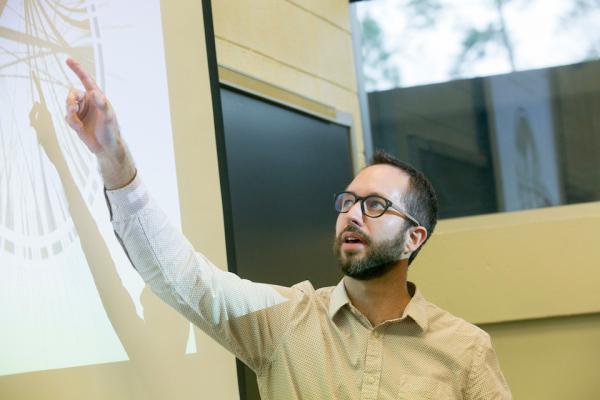CANCELLED: Exposure to Opposing Views Can Increase Political Polarization: Evidence from a Large-Scale Field Experiment on Social Media
A Research Seminar with Chris Bail, Associate Professor of Sociology and Public Policy, Duke University
Matrix is located on the 8th floor of Barrows Hall, on the UC Berkeley campus, near Telegraph and Bancroft Avenues, just up the hill from Sather Gate. There are entrances at both ends of the building, but only one of the elevators on the eastern side goes directly to the 8th floor. You can alternatively take the stairs to the 7th floor and walk up the stairs.

DUE TO TRAVEL CHALLENGES RELATED TO HURRICANE FLORENCE, THIS EVENT HAS BEEN CANCELLED.
Please join us on September 17 from 2-3:30pm for a presentation by Chris Bail, the Douglas and Ellen Lowey Associate Professor of Sociology and Public Policy at Duke, entitled "Exposure to Opposing Views can Increase Political Polarization: Evidence from a Large-Scale Field Experiment on Social Media." This presentation is part of the UC Berkeley Department of Sociology's Colloquium Series and the DLab/Matrix "Social Science and Data Science" series.
Abstract
Social media sites are often blamed for exacerbating political polarization by creating "echo chambers" where people are seldom exposed to information that contradicts their pre-existing beliefs. We conducted a field experiment on one such platform designed to disrupt echo chambers by exposing a large sample of Democrats and Republicans to a Twitter bot that retweeted twenty-four messages each day from elected officials and other opinion leaders with political views that are different from their own each day. We found that Republicans became substantially more conservative after following a liberal Twitter bot. Democrats exhibited slight increases in liberal attitudes after following a conservative Twitter bot, but these effects were not statistically significant. Despite several important limitations of our study, these findings have important implications for ongoing attempts to reduce political polarization in applied settings and the emerging field of computational social science.
About the Speaker
Chris Bail is the Douglas and Ellen Lowey Associate Professor of Sociology and Public Policy at Duke. His research examines political polarization, culture and social psychology using tools from the emerging field of computational social science (e.g. digital trace data from social media sites, automated text analysis, and machine learning).
Chris is the recipient of a Guggenheim Fellowship, a Carnegie Fellowship, and numerous awards from the American Sociological Association, the Association for Research on Non-Profit Organizations and Voluntary Action, and other scholarly associations. His research has been published by Princeton University Press, the Proceedings of the National Academy of Sciences, the American Journal of Public Health, the American Sociological Review, and other leading publications. Funding for his work has been provided by the National Science Foundation, the National Institutes of Health, the Alfred P. Sloan Foundation, the Robert Wood Johnson Foundation, and the Russell Sage Foundation. His research has also been covered by major media outlets such as NBC News, National Public Radio, the Washington Post, and the BBC.
Chris is the Editor of the Oxford University Press Series in Computational Social Science and the co-founder of the Summer Institutes in Computational Social Science, which are free training events designed to introduce junior scholars to the field that are held concurrently in seven universities around the world each year. Chris also serves on the Advisory Council to the National Science Foundation's Social Behavioral and Economic Sciences Directorate, and helped create Duke's Interdisciplinary Data Science Program. He is also the Director of Duke's new Polarization Lab.



